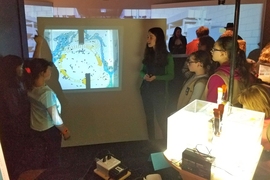Kristin Bergmann, the Victor P. Starr Career Development Assistant Professor in MIT’s Department of Earth, Atmospheric and Planetary Sciences (EAPS) has been awarded a 2018 Packard Fellowship in Science and Engineering. Bergmann is one of 18 early-career scientists in the nation selected this year. The prestigious fellowship, which includes a research grant of $875,000, encourages researchers to take risks and explore new frontiers in their field.
“We are all extremely proud and happy that Kristin has received this well-deserved honor,” said Robert van der Hilst, the Schlumberger Professor of Earth and Planetary Sciences, EAPS department head, and Packard Fellow himself. “Kristin is a wonderful colleague, deeply engaged with our academic community. Running a lab and a field program is a major challenge, and the Packard Fellowship will help her pursue her exciting and ambitious studies of geological processes in Earth’s deep time.”
Bergmann is a geobiologist who reconstructs Earth’s ancient climate and surface environments. She uses methods spanning field measurements, isotope geochemistry and microanalysis to study rocks deposited in ancient oceans before and during the evolution of early animals.
“It is a great honor to have our work recognized and supported by the David and Lucile Packard Foundation,” Bergmann said.
During her fellowship, Bergmann will study ancient climate dynamics and dramatic environmental changes that accompany the emergence and dominance of multicellular, complex life on Earth. “I am fortunate at MIT to be able to pursue a research agenda that includes both field observations and laboratory-based geochemical techniques,” said Bergmann. “Often a researcher feels pulled between whether to spend months in the field or in the lab, but combining and balancing these allows my students to approach a problem from two sides.” By understanding the rocks within their environmental context, Bergmann can focus her research. “Where the sample comes from and its context is as important to me as the laboratory measurements we make at MIT and elsewhere. The Packard Fellowship will support this multidimensional approach.”
Bergmann feels grateful and inspired by the award: “Geobiology is an interdisciplinary field requiring a variety of approaches and I’m very lucky to have the chance to interact with and learn from diverse, passionate scientists here at MIT and, before that, at Carleton College, Caltech, and Harvard. I look forward to meeting and interacting with other Packard Fellows from across the country.”
The David and Lucile Packard Foundation is a private family foundation created by David Packard, cofounder of the Hewlett-Packard Company.









